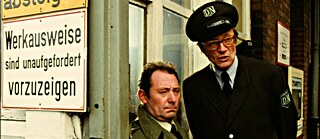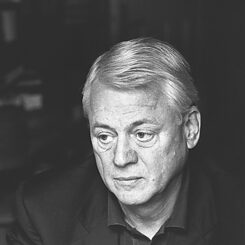|
6:00 PM
Strongman Ferdinand (Der starke Ferdinand)
Film series|Kino x 3: Alexander Kluge
-
Goethe-Institut, Chicago, IL
- Language German with English subtitles
- Price Free and open to the public
- Part of series: Kino x 3

Director: Alexander Kluge, 1979, Germany, 121 min., color and b/w, German with English subtitles
Ferdinand Rieche is an energetic little man with big goals and an unwavering verve in achieving them. Rieche is employed as a police officer in the criminal investigation department, but does not at all feel challenged in this job, especially since he has been accused of "methods that exceed the scope of his duties”. Rieche is looking for a new field of activity in which he can live out his thirst for order with ruthless German zeal. As a new plant security officer, he ensures the safety of a large factory. Rieche is completely absorbed in his new field of activity and promptly overdoes it in his drive for perfection, so that his "security and protection measures" for the safety of the factory are far more risky than an external threat to the company. Rieche observes and denounces, becoming a one-man Stasi system in the smallest possible area. He studies leftist literature, because he suspects his opponents there as well, and waits full of hope for his chance to proof his all-encompassing surveillance system. It comes one day in the form of the harmless little canteen employee Gertie Kahlmann, who steals food from the factory to save up the money for her own cab.
Reserve your free tickets
Alexander Kluge, born in Halberstadt in 1932, received his doctorate in law in 1956 on "University Self-Administration," a subject that soon became politically explosive. He became a legal advisor to the Frankfurt Institute for Social Research and very soon became a confidant of T.W. Adorno. In the early 1960s, Kluge became known simultaneously as a writer and filmmaker: in 1962, he read from the volume Lebensläufe at Gruppe 47 and, together with 25 young filmmakers, published the Oberhausen Manifesto; in 1966, he became the first German after the war to receive the Silver Lion at the Venice Film Festival for Abschied von Gestern, starring Alexandra Kluge. This opens a door in Europe for the New German Cinema, of which Kluge may be called the spiritus rector, insofar as he uses all his strength to hold these individualists of cinema together and to establish institutional, financial safeguards for a German auteur film (founding of the Ulm Institute for Film Design in 1962, framework agreement film / television in 1974). As Kluge knows as a critical theorist, it is never just a matter of the success of individual works; what is needed is the creation of an authentic public, a stable connection with the audience, and individuals cannot do that alone.
Ferdinand Rieche is an energetic little man with big goals and an unwavering verve in achieving them. Rieche is employed as a police officer in the criminal investigation department, but does not at all feel challenged in this job, especially since he has been accused of "methods that exceed the scope of his duties”. Rieche is looking for a new field of activity in which he can live out his thirst for order with ruthless German zeal. As a new plant security officer, he ensures the safety of a large factory. Rieche is completely absorbed in his new field of activity and promptly overdoes it in his drive for perfection, so that his "security and protection measures" for the safety of the factory are far more risky than an external threat to the company. Rieche observes and denounces, becoming a one-man Stasi system in the smallest possible area. He studies leftist literature, because he suspects his opponents there as well, and waits full of hope for his chance to proof his all-encompassing surveillance system. It comes one day in the form of the harmless little canteen employee Gertie Kahlmann, who steals food from the factory to save up the money for her own cab.
Reserve your free tickets
Alexander Kluge, born in Halberstadt in 1932, received his doctorate in law in 1956 on "University Self-Administration," a subject that soon became politically explosive. He became a legal advisor to the Frankfurt Institute for Social Research and very soon became a confidant of T.W. Adorno. In the early 1960s, Kluge became known simultaneously as a writer and filmmaker: in 1962, he read from the volume Lebensläufe at Gruppe 47 and, together with 25 young filmmakers, published the Oberhausen Manifesto; in 1966, he became the first German after the war to receive the Silver Lion at the Venice Film Festival for Abschied von Gestern, starring Alexandra Kluge. This opens a door in Europe for the New German Cinema, of which Kluge may be called the spiritus rector, insofar as he uses all his strength to hold these individualists of cinema together and to establish institutional, financial safeguards for a German auteur film (founding of the Ulm Institute for Film Design in 1962, framework agreement film / television in 1974). As Kluge knows as a critical theorist, it is never just a matter of the success of individual works; what is needed is the creation of an authentic public, a stable connection with the audience, and individuals cannot do that alone.
Related links
Location
Goethe-Institut
150 N Michigan Ave
Suite 420
Chicago, IL 60601
USA
150 N Michigan Ave
Suite 420
Chicago, IL 60601
USA
Free, registration required
